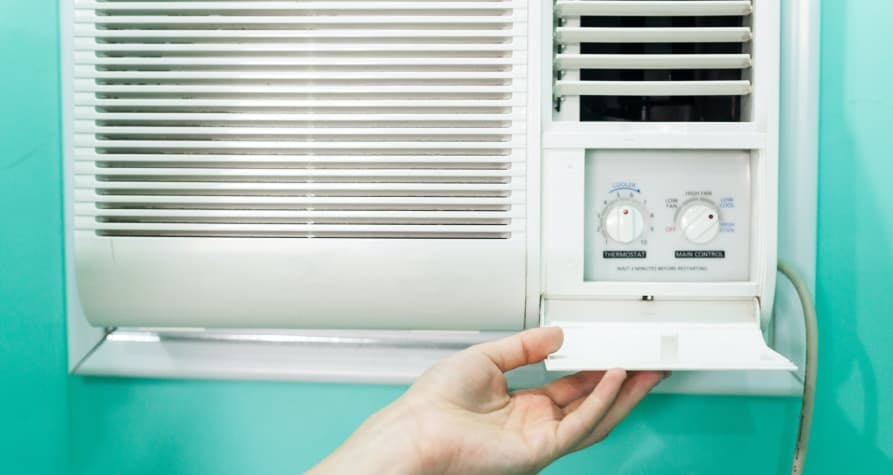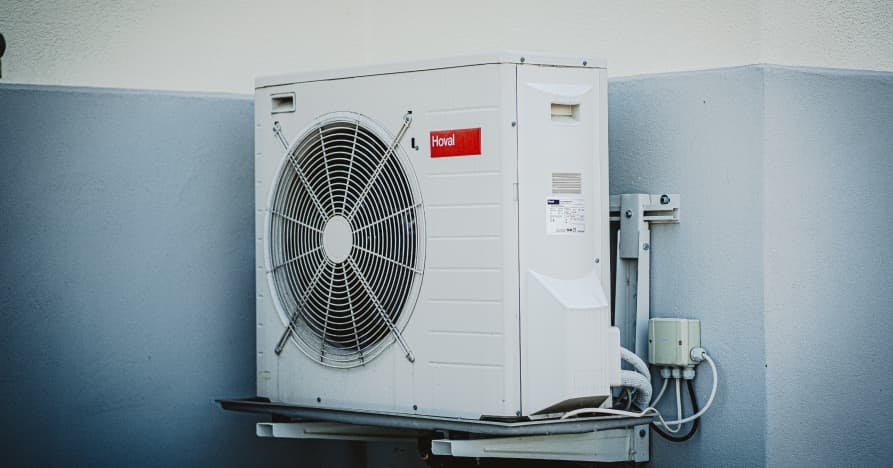ESG / CSR
Industries
Air Conditioner Is Bad for the Environment – But Is There a Choice?



Key Topics You’ll Learn About in This Article
The environmental impact of air conditioning
A breakdown of the tools and processes required for A/C
Ways to avoid the worst of the effects of A/C on the planet
Air conditioner has become a norm for the majority of us during scorching summers, and something many of us from western countries have grown accustomed to living with – but does air conditioner feel as good to the environment as it does to us?
This leaves us with the hallmark question: are air conditioners bad for the environment?
In this article, we’ll break down why air conditioning is an ecological disaster: from how it uses extensive energy, drives up energy bills, and even creates emissions after an air conditioning unit has died.
What is Air Conditioning?
Air conditioning, more commonly referred to as AC, is a central system that is used to alter the temperature indoors for comfort purposes. Air conditioners are used to cool and dehumidify the air to allow for more comfortable living or work spaces.
Air conditioning systems help to make a cooler environment with these components:
Evaporator Coil
Located inside the indoor unit, this coil contains refrigerant that evaporates to absorb heat from indoor air — the key to cooling.
Compressor
Found in the outdoor unit, it pressurises the refrigerant gas and moves it to the condenser coil to release heat.
Condenser Coil
Also outdoors, this coil releases heat back into the environment — it’s what produces the hot air you feel near running AC units.
Expansion Valve
Regulates the amount of refrigerant between the coils, ensuring a consistent and efficient cooling cycle indoors.
Refrigerant
The cooling fluid that absorbs heat from inside air. It’s highly effective but also one of the most environmentally sensitive AC components.
Air Filter
Traps dust, pollen, and pollutants to keep indoor air clean and maintain the system’s efficiency over time.
However, today’s air conditioners often do a lot more than just cool the air – they often offer settings for air filtration, which can actually be useful in the midst of wildfire smoke or poor air quality to prevent allergens and other consequences of bad air quality.
Air conditioning has become popular not only inside homes, schools, and offices – but everywhere: from cars, buses, metros, and shopping malls to ensure the comfort of the user from anywhere. However, it's important to remember that while air conditioning is a momentary sigh of relief for us – it's an ongoing nightmare for the planet as it elicits negative environmental impacts.

How Often Is Air Conditioning Used?
Air conditioning usage depends on the country and its culture, as some countries prefer more environmentally friendly refrigerants and energy efficient methods to trap heat, such as electric fans – whereas other countries such as the U.S. tend to leave the A/C on 24/7.
To better understand why air conditioning is so commonly used in certain parts of the world, it’s useful to have a quick history recap.
Air conditioning was first invented by Dr. John Gorrie back in the mid 1800s, with Willis Carrier officially designing the first electrical air conditioning unit in 1902 – bringing it to the public for their enjoyment as early as 1904.
Many of these first air conditioning units were installed in large buildings in Los Angeles and New York – which means Americans have been accustomed to air conditioners for well over one hundred years, now.
Countries like the U.S. are infamous for their excessive use of air conditioning – but what about the rest of the world?
Air conditioner use depends on several factors, such as:
As concern for climate change continues to grow, many are beginning to wonder if the comfort of using an air conditioner is worth the environmental impact it creates.
🌡️ Increase in Air Conditioning Usage Over the Past Four Decades 🧊
| Region | Increase in Usage | Details |
|---|---|---|
| 🇪🇺Europe | 📈More than doubled since 1990 | Europe has seen a significant increase in air conditioning usage, driven by rising temperatures and heatwaves. This trend is expected to continue as climate change impacts the region. [Source] |
| 🇺🇸United States | 🏠Significant increase over 45 years | Air conditioning presence in US homes has grown substantially over the last four and a half decades, with a marked increase in installation rates and usage across the country. [Source] |
| 🌏Southeast Asia | 🚀Rapid growth | Southeast Asia has experienced rapid growth in air conditioning usage due to rising incomes and urbanisation. The region's hot and humid climate has also contributed to the increased demand. [Source] |

Why is Using Air Conditioner Bad For the Environment?
Air conditioner is bad for the environment as AC units contribute to excessive energy production, global electricity, and emits additional carbon dioxide into the atmosphere.
Did you know that the number of air conditioner units has doubled in Europe since 1990, and could quadruple by 2050?
There are multiple reasons why using an air conditioner is bad for the environment:
- Increased Energy Demand due to air conditioning is alarming. In fact, air conditioning results in around 20% of the electricity used in buildings today – and amounts to 10% of electricity consumption worldwide.
- Greenhouse Gas Emissions are on the rise from air conditioning, and they currently account for almost 4% of the world's overall greenhouse gas emissions.
- Refrigerants and Hydrofluorocarbons (HFCs) which are required for an air conditioner to properly function pollute the atmosphere and contribute to ozone depleting substances (ODS).
Why Are Air Conditioning Machines Bad for Fighting Against Climate Change?
In addition to the excessive energy consumption and pollutants created by air conditioning, the units themselves are also bad for the environment.
Reasons why A/C is bad
Here are just a few reasons why more electricity used with A/C, even on the hottest days – may not be the best way to help the planet stay cool:
- Contributes to Plastic Waste – First off, many manufacturers will make use of plastic in order to reduce production costs, and while this may benefit the company financially – the planet plays a price, as plastic in landfills contributes to excess greenhouse gas emissions.
- Large Proportion of Harmful Metals Used – Air conditioning machines also often require the use of aluminum, copper, and other metals which can have an impact on marine life when not disposed of properly.
- Not Ideal for Air Quality – Even modern air conditioners aren't perfect, as ducts can collect bacteria that will be diffused into the air every time someone turns the unit on – which isn't healthy to inhale.
Long story short, manufacturing and disposing of air conditioner units presents an entirely different (but equally harmful) problem for the planet.
Examples of How Air Conditioning Has Negatively Impacted the Environment
A/C has contributed to several negative impacts – such as by perpetuating the greenhouse effect, encouraging people to use more energy when unnecessary, and normalising the use of air conditioners around the world despite the fact they contribute to global warming
Air conditioning has not just been something designed for comfort, but has actually helped some people deal with the side effects of climate change – such as helping people purify indoor air in the midst of poor air quality following the Canadian wildfires.
Negative Effects of A/C
Urban Island Effect
For instance, air conditioners have exacerbated the current issue with the urban island heat effect – which refers to when cities have high amounts of pavement, buildings, and other surfaces that hold onto heat. This results in these cities using more air conditioning to cool off, which raises energy costs, aggravates pollution, and even results in mortality.
Cities that experience the urban heat island effect include New York, Houston, Los Angeles, Chicago, Phoenix, and more – totaling to over 40 million Americans that suffer from this phenomenon. This shows that the use of air conditioners may no longer be a choice, but a necessity – meaning we may need to rethink the way we manufacture and design air conditioners in the future as scorching temperatures become the new normal.
Stress on Power Grids
Air conditioning also puts an enormous strain on electrical infrastructure and power grids, both of which do not help the ongoing crisis of climate change. This stress on power grids is likely to ensue throughout summer 2024 as other cities across the U.S. experience more heat waves in the coming months.
Cities like Santorini in Greece help to prevent the urban heat island effect as the majority of their buildings and residencies are painted white – which deflect heat.

What Are Some Alternatives to Using an Air Conditioner?
Air conditioning is only getting more popular as temperatures spike around the world, therefore – it's more important than ever to find sustainable and energy efficient alternatives to air conditioning, such as alternatives like energy efficient A/C units or an available other appliance that uses less energy than A/C to cool your home.
Think of when you go to the frozen section of the grocery store, and you didn’t bring any shopping bags. You now have to rush home to get the groceries you bought back into the freezer. However, if you brought an insulated grocery bag to the store instead – your groceries would stay frozen for longer. The same goes for our homes and buildings: the infrastructure needs to be built in a way that mitigates the need for excessive air conditioning.
However, there are still steps people can take to keep their homes cool during a heat wave without the need for air conditioning.
How to Keep Cool without A/C
- Invest in Blackout Curtains – Investing in blackout curtains for your windows to prevent the light from coming in can help reduce the amount of warmth absorbed inside your home. You’d be surprised at how effective this is at maintaining the indoor temperature of your home.
- Encourage Others to Set Temperatures Lower – Word of mouth could do a world of good with air conditioning, too. If people encouraged one another to set their thermostat at a higher temperature or simply to open windows for natural ventilation instead of turning on the AC – our dependency to it would decrease overtime.
This is already being done in cities around the world where air conditioning isn’t implemented everywhere. For instance, some metro lines in Paris still run old trains that don’t have AC – so people often crack open the windows to ventilate the train.
- Government Protocols – Governments can get involved to prohibit the use of superfluous air conditioning, too. For instance, government bodies could implement regulations to improve energy efficiency and decrease the use of refrigerants used in common air conditioning systems – especially systems in large buildings such as schools and offices.
- Cut Off Supply During High Demand – More extreme measures could be taken for air conditioning, too – such as trying to determine when peak demand to use air conditioning is and implementing energy rationing. This was done in the U.K. last winter to avoid using heating as an attempt to conserve energy.
- Open Windows – This may seem self explanatory, but you'd be surprised at how much cooler your home could feel with proper ventilation. It's a good idea to leave your windows open for 20 minutes to a couple of hours every day to reduce the chances of mold growth and cool your home.
However, this tactic may not fare as well in the U.S. – seeing as of 2020 – a whopping 88% of Americans made use of air conditioning. Only 5% of homes in the U.K. use air conditioning, and the rest of mainland Europe is still conservative in their usage of air conditioning as opposed to Americans – with around 19% of Europeans reluctantly making use of air conditioning as a result of the deleterious heatwaves have ensued in recent summers.
Ultimately, the use of air conditioning is a real problem that needs to be addressed. There are numerous ideas to combat this issue that could be successful, but it is up to our governments, industries, and support of the general public to prevent the use of air conditioners from setting the world on fire.

What About Greenly?
If reading this article about air conditioners and how it impacts the environment has made you interested in reducing your carbon emissions to further fight against climate change – Greenly can help you!
Keeping track of all the appliances in your business like air conditioners that contribute to emissions can be challenging, but don’t worry – Greenly is here to help. Click here to schedule a demo to see how Greenly can help you comply with all of the upcoming regulations relevant to your company.
Greenly can help you make an environmental change for the better, starting with a carbon footprint assessment to know how much carbon emissions your company produces.






